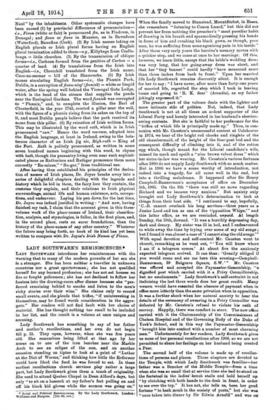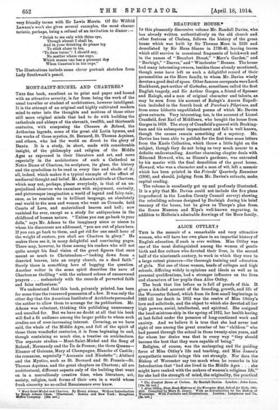LADY SOC1t1WARK'S B,EMINISCENCES.*
LADY SOUTHWARK introduces her reminiscences with the warning that to many of the modern pursuits of her sex she is a stranger. She has been neither a traveller in unknown countries nor a great sportswoman ; she has not qualified herself for any learned profession; she has not set houses on fire or fought policemen ; she has not declined to follow her hostess into the drawing-room after dinner .because she "pre- ferred remaining behind to smoke and listen to the men% risky stories over their wine." She claims only to t000ra small events, and she pleado that trifles, "if uninteresting in themeelvett, may be _found worth.consideration in the aggre- gate." Her readers will not find fault with her choice of material. She bas.thought nothieg too small to be included in her list, and the result is a volume at once unique and amusing.
Lady Southwark has something to say of her father and mother's recollections, and her own do not begin till p. 15. They open, however, when she was five years old. She remembers being lifted at that age by her nurse on -to one of the iron benches near the Marble Arch to see an eclipse of the =sun, and on another occasion standing on tiptoe to look at a -print of "Luther at the Diet of Worms," and thinking bow little the'Reformer could have liked the food be was forced to eat. In these earliest recollections church services play rather a large part, but Lady Southwark gives them a touch of originality. She used to attend Quebec Chapel in Dean Alford's days, but only " to it on a hassock at my father's feet pulling on and off- his black kid gloves while the sermon was going OD."
Social and Politica Reminiscences. By the Lady 'Southwark. London s Williams and Norgate. [12a. ed. net)
When the family moved to Stanstead, Mountfitohet, in Essex, she remembers "listening to Canon Luard," but this did not prevent her from noticing the preacher's " most Neither habit of drawing in his breath and spasmodically pressing his hands in front of him and crushing his black gown, as though, poor man, he was suffering from some agonizing pain in his inside." After these very early years the heroine's memory moves with a quicker step, and we come at once to her marriage. Of this, however, we learn little, except that the bride's wedding dress was very long, that her going-away dress was short, and that her "tiny bonnet" could hardly "have measured more than three inches from back to front." Upon her married. life Lady Southwark remains discreetly silent. It is enough for her to say : "I have never, after more than forty-one years of married life, regretted the step which I took in leaving home and going to ' R. K. dear' (Arcadia), as my father jokingly expressed it."
The greater part of the volume deals with the lighter and more intimate side of politics. Not, indeed, that Lady Southwark is not at all times an ardent supporter of the Liberal Party and keenly interested in her husband's election- eering contests. But she is faithful to her preference for the "trifles of which life is principally made up." Thus, in con- nexion with Mr. Canston's unsuecesaful contest at Colchester in 1874, we hear of the bright red cheeks and ringlets of the old chambermaid, of the height of the four-post bed and the consequent difficulty of climbing into it, and of the rotten egg which, though meant for the Liberal candidate's wife, missed its mark and spoilt a "nice brown velvet dress " which her sister-in-law was wearing. Mr. Causton'e various fortunes after 1880 do not supply Lady Southwark with so much matter. But in 1906 we have a scene worthy of introduction, not indeed into a tragedy, for all came well in the end, but into a thrilling melodrama. It happened after Sir Henry Campbell-Bannerman's acceptance of office on December 5th, 1905. On the 8th " there was still no news regarding Richard and we became very anxious." But anxiety only brought out Lady Southwark's determination to look at things from their best side. "I continued to say, hopefully, ' C.-B. cannot overlook his long services—three years as a Junior Lord and ten as one of the Opposition Whips,'" and this latter office, as we are remiuded, unpaid. At length Sunday, the 10th, dawned. " It was a horribly depressing day, dark and dreary. My sister was ill in bed, and I endeavoured to while away the time by trying over some of my old songs ; but I found it was almost a ease of 'I cannot sing the old songs.'" With equal devotion and self-control Mr. Causton went to church, remarking as he went out, " Yon vcill know where I am if a telegram comes.' At about five the anxiously expected telegram arrived. It ran thus: 'Greatly obliged if you would come and see me here this evening—Campbell- Bannerman, 29 Belgrave Square, S.W.' " Mr. Oauston was offered and accepted the Paymaster-Generalship, "a dignified post which carried with it a Privy Councillorship, but no emoluments." Lady Southwark's self-restraint in not italicising the last three words does her great credit. Many women would have resented the absence of payment when in offtee more bitterly than thesame privation when in opposition. It was afarther shock-when her natural anxiety to hear the details of the eeremony of.awesring in a Privy Councillor was defeated by Mr. Oauston's refusal to violate his oath of secrecy. Happily, there was comfort in store. The new office carried with it the Chairmanship of the Commissioners of Chelsea Hospital and of the Governing Body of the Duke of York's -School, and in this way the Paymaster-Generalship " brought him into eontaet with a number of most charming men." Unfortunately for her readers, Lady Southwark gives us none of her personal recollections after 1906, so we are not permitted to share her feelings on her husband being created a Peer.
The -second half of the volume is made up of recollec- tions of persons and plaoes. Three chapters are devoted to the Temple, with which Lady Southwark was familiar—her father was a Boucher of the Middle Temple—from a time when she vacs° small that at service time she bed-to stand on the footstool in the ladies' hench stalls and hold herself up " by clutching with both hands to the desk in -front, in order to see over the top." It has not, she tells us, been her good fortune " to.beak much in.the society of poets," but she was "once taken into dinner by Sir Edwin Arnold" and was ox very friendly terms with Sir Lewis Morris. Of Sir Wilfrid Lawson 's work she gives several examples. the most charac- teristic, perhaps, being a refusal of an invitation to dinner:—
"Drink to me only with thine eye, Though absent I shall be, And in your drinking do please try To stick alone to tea.
• Te duce tutus '! I should say, No matter where one sups, Which means one has a pleasant day When Causton's in his cups."
The illustrations include some clever portrait sketches from Lady Southwark's pencil.











































 Previous page
Previous page